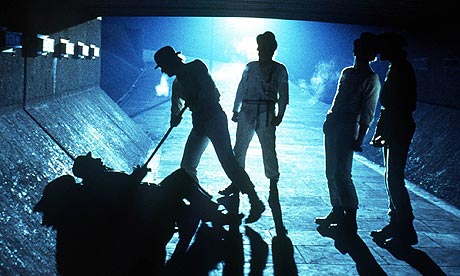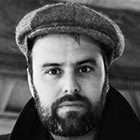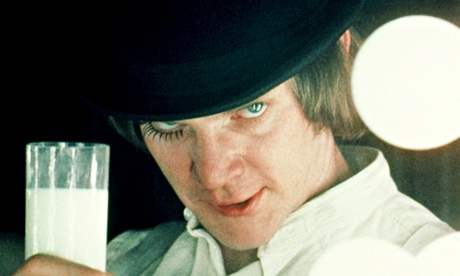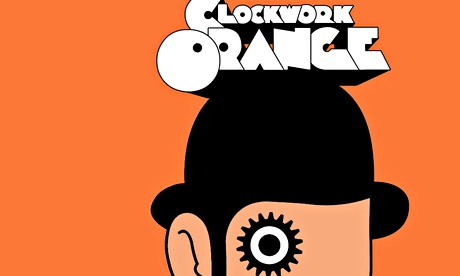Fifty years ago today, Anthony Burgess published his ninth novel, A Clockwork Orange. Reviewing it in the Observer, Kingsley Amis called the book "the curiosity of the day". Five decades later and there is still nothing quite like it.
When discussing A Clockwork Orange, many mistakenly confuse the book with Stanley Kubrick's 1971 film and immediately focus on the violence of the story, when really it's the language of the book – a vernacular so lively and colourful it renders those much-discussed descriptions of beatings and rape almost – almost – comical – that is its most remarkable and revolutionary aspect. Kubrick's dazzling adaptation contributed greatly to the book's ascension to the lofty position it holds today as one of pop culture's most influential and enduring pieces of literature, but it's the slang that 15-year-old protagonist Alex uses in his narration – a post-Joycean mash-up of Slavic, Cockney rhyming, Gypsy and Polari – that allows Burgess to present Alex's diabolical deeds as digestible, if not remotely justifiable.
Certainly there is a lyricism to the language that makes the Beethoven-loving Alex's animalistic behaviour all the more disturbing. It triggers the same reaction in the reader as when we first saw those school portraits of James Bulger's killers, or other such adolescent-as-killer criminal cases. Cherubic might and murderer – the two almost don't compute. But let's not forget that Alex is the victim of violence too: through his brainwashing – violence used to quash violence – Burgess pre-empted many of Baudrillard's ideas on the violence of the visual image.
Because A Clockwork Orange is also an allegorical tale of state control – of the establishment versus the individual, of puppet-masters and puppets – which could only have been concocted during the paranoid postwar/cold war years, but whose themes have never really diminished since publication. Alex represents anti-authoritarianism. He is the iconoclastic anarchist, the insubordinate lacking obedience to social order, who himself became an icon – and it's this, coupled with his powerful aesthetic, that has allowed his influence to extend beyond literature into wider culture.
Actually, Kubrick was beaten to the onscreen adaptation by Andy Warhol, whose film Vinyl explored similar themes of free will, albeit it in a rather flawed, freeform way. It was Kubrick's take on Alex's "height of fashion" clothes rather than Burgess's (black tights over a jelly mould at the crotch, "waisty jacket without lapels … off-white cravats which looked like whipped-up kartoffel") that has been aped by everyone from football hooligans to bands from the Adicts to Blur. (Unsurprisingly, in fact, the book's influence upon music is far-reaching. Many have identified aspects of Alex in Bowie's flamboyant Ziggy Stardust and John Lydon's disdainful Johnny Rotten; then there are the bands who took their name from the book: Heaven 17, Moloko and Campag Velocet among others.)
The book's dystopian setting and aestheticisation of violence meanwhile seemed to signify a re-examining of man's cruellest impulses. On this subject, it's possibly the key post-war text, and its force can be felt in the work of JG Ballard, Philip K Dick, William Gibson, Jeff Noon, Chuck Palahniuk; in American Psycho, Battle Royale and The Hunger Games; and beyond literature into visual art and the glut of ultraviolent films that emerged in the 1990s
Next month, the International Anthony Burgess Foundation are hosting a multi-disciplinary conference to celebrate the book's anniversary. It seems like a must for oomny devotchkas and malchiks who like hanging around the old biblio. Real horrorshow.










